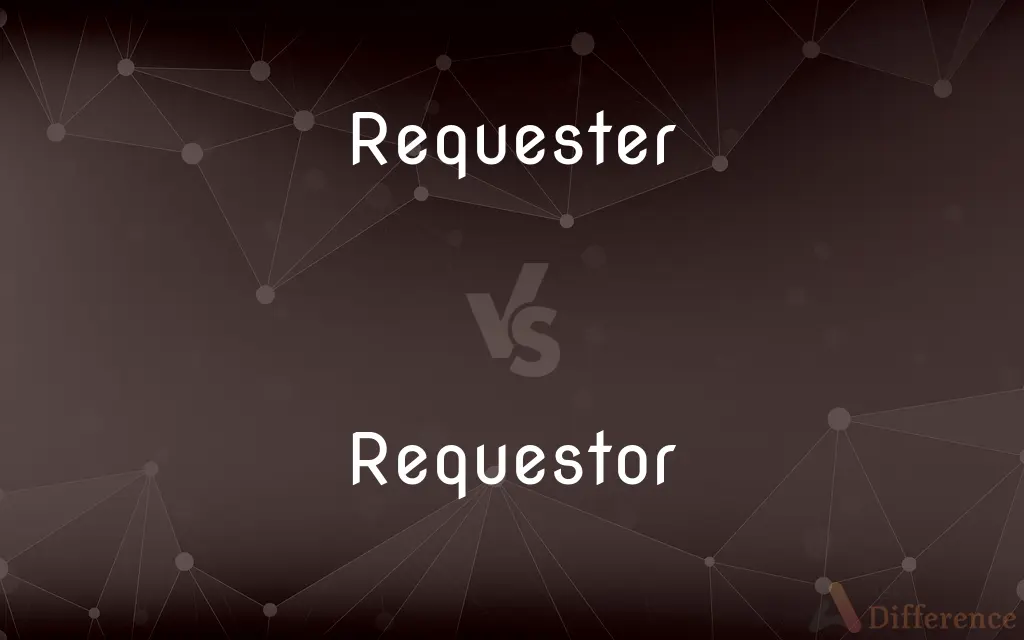Requester vs. Requestor — What's the Difference?
By Tayyaba Rehman — Updated on August 22, 2023
"Requester" and "requestor" are both nouns denoting someone who makes a request, but "requester" is the more common form in American English.

Difference Between Requester and Requestor
Table of Contents
ADVERTISEMENT
Key Differences
"Requester" and "requestor" are two variations of the same word. Both words are nouns and describe an individual or entity that makes a request. While they share this meaning, they differ in their usage and regional popularity.
In the realms of American English, "requester" is the predominant form. Its consistent use across official documents, software applications, and general communications gives it an edge over "requestor". On the other hand, "requestor" is sometimes seen, particularly in older texts or in specific contexts.
Despite the distinction in preference, there's no inherent difference in meaning. A "requester" of information and a "requestor" of information are essentially the same. However, when drafting or communicating in professional settings in the US, it's advisable to stick to "requester" as it's more universally recognized and understood.
Yet, it's also important to be adaptive. Should you encounter "requestor" in any documentation, especially in older scripts or in contexts outside of the US, it's crucial to understand its equivalency to "requester". In essence, while "requester" may be the modern go-to, "requestor" still holds its ground in select contexts.
Comparison Chart
Spelling
Requester ends in "er".
Requestor ends in "or".
ADVERTISEMENT
Common Usage
More prevalent in American English.
Less common, especially in modern contexts.
Historical Usage
Has been consistent throughout history.
More commonly seen in older texts.
Acceptance in Professional Settings
Widely accepted in professional American settings.
Less commonly accepted in professional settings.
Associated Regions
Primarily used in the US.
Used in older scripts or outside the US.
Compare with Definitions
Requester
To express a desire for, especially politely; ask for. Often used with an infinitive or clause
Requested information about the experiment.
Requested to see the evidence firsthand.
Requested that the bus driver stop at the next corner.
Requestor
One who, or that which, makes a request.
Requester
A person who formally asks for something.
The requester patiently waited for a response.
Requestor
An individual making a formal appeal or submission.
The requestor sought approval for the project.
Requester
An entity or system seeking specific information or action.
The software requester sent a command to retrieve the file.
Requestor
A party soliciting a particular service or response.
The requestor sent an email for clarification.
Requester
One who, or that which, makes a request.
Requestor
Someone who seeks information or action from another.
The requestor asked for directions to the nearest station.
Requester
One who requests; a petitioner.
Requestor
One who expresses a desire or need for something.
The requestor wished to join the club.
Requester
One who petitions for a service or favor.
The requester filled out the necessary paperwork.
Requestor
An entity, often software, demanding specific data or actions.
The system's requestor triggered a data retrieval function.
Requester
An individual or group seeking assistance or guidance.
The requester approached the help desk with a query.
Requester
Someone who makes an inquiry or expresses a desire.
The requester wanted details about the event.
Requester
Something asked for
Wasn't happy until he got his request.
Requester
To ask (a person) to do something
The police requested her to accompany them.
Requester
An act of asking for something.
Common Curiosities
Do the terms have different meanings?
No, "requester" and "requestor" essentially have the same meaning, though their usage can vary based on context or region.
What are the meanings of "requester" and "requestor"?
Both "requester" and "requestor" are nouns denoting someone who makes a request.
Which of the two terms is more commonly used in American English?
"Requester" is more commonly used in American English compared to "requestor".
How should I decide which term to use in my writing?
Consider your audience and the most commonly accepted term in the given context. In American English, "requester" is a safer bet.
If I encounter "requestor" in a document, should I correct it?
Not necessarily. If the document is older or if "requestor" is consistently used in a specific context, it might be intentional.
Is one term more formal than the other?
Neither term is inherently more formal, but "requester" is more universally recognized and used, especially in professional American contexts.
Why might I see "requestor" in older texts?
"Requestor" is sometimes seen in older texts or in specific contexts, while "requester" has been consistent throughout history.
Are there specific industries or fields where one term is favored over the other?
In general, professional settings in the US favor "requester", but both terms can be encountered depending on the context.
Is it incorrect to use "requestor" in American English?
It's not incorrect to use "requestor", but "requester" is the preferred form in American English.
Are there any major dictionaries that do not recognize one of these terms?
Most major dictionaries recognize both terms, but "requester" often receives more prevalent acknowledgment, especially in American English dictionaries.
Share Your Discovery

Previous Comparison
Villainry vs. Villainy
Next Comparison
Wardrobe vs. ChifforobeAuthor Spotlight
Written by
Tayyaba RehmanTayyaba Rehman is a distinguished writer, currently serving as a primary contributor to askdifference.com. As a researcher in semantics and etymology, Tayyaba's passion for the complexity of languages and their distinctions has found a perfect home on the platform. Tayyaba delves into the intricacies of language, distinguishing between commonly confused words and phrases, thereby providing clarity for readers worldwide.
















































